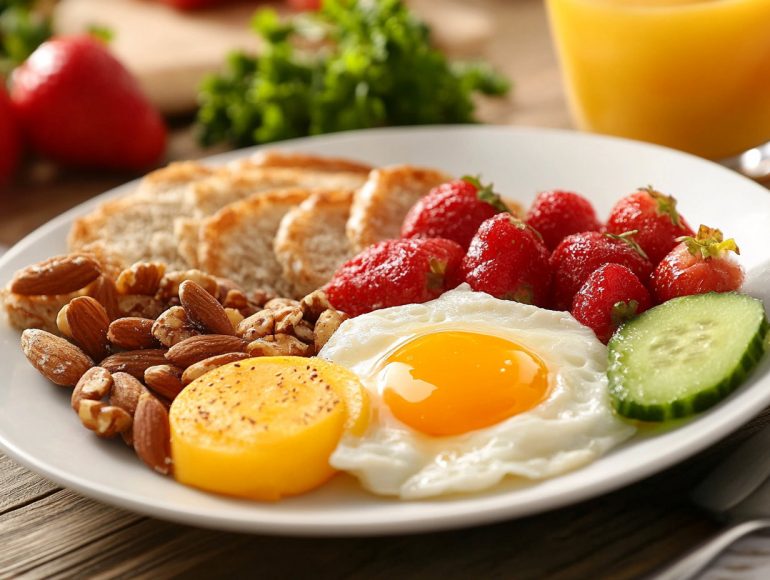The best time to eat breakfast, according to a nutritional expert
If you are guilty of skipping the first meal of the day during busy mornings, you need to read this
If breakfast was a character in the world of Barbie, it would likely be Alan—easily ignored in favour of lavish brunches and hastily compensated for by mid-day snacking. While the first meal of the day may not command the same main character energy as other meals, ensuring that you are getting adequate nutrition from the first meal of the morning can play a fundamental role in determining your energy levels throughout the day. But what is the best time to eat breakfast and what should be included in your plate? We took our questions to a nutritionist and here’s what we found—and no, a grab-and-go coffee on an empty stomach doesn’t make the cut.
Is there a best time to eat breakfast?
The rule of thumb is to have breakfast within one hour of waking up, according to nutritionist Karishma Chawla. “This helps keep the metabolism high and prevents muscle loss as well as cravings in the later half of the day. Not having breakfast within the first hour of waking can also lead to fatigue later on which then interferes with the normal functioning and productivity of the day,” she explains.
What happens when you skip breakfast?
Heading out of the house in the morning without having breakfast is guaranteed to earn you a spot in any nutritional expert’s bad book—and with good reason. “Individuals who do not feel hungry when they just wake up are usually the ones who require a lot of care in terms of their liver and gut health. So, the minute you boost the liver and the digestive fire, our innate nature of feeling hungry in the morning comes back,” she says.
While certain diets such as intermittent fasting can encourage skipping breakfast in the morning, Chawla recommends stabilising blood sugar levels by eating every 2-4 hours to boost the metabolism throughout the day.
How to plan the ideal breakfast every morning
The foundation stone of the ideal breakfast lies in discovering good protein options such as eggs, paneer, low-fat yoghurt, whey isolates and vegan protein including peas and hemp. This can be combined with carbohydrates with a low glycaemic index (GI), such as red rice poha, jowar chilla or dosa, brown rice poha, oats, buckwheat or quinoa upma. “I would love to add some liver detox foods with good fat such as a vegetarian smoothie consisting of apple or orange, spinach or kale along with chia seeds or flaxseeds,” she adds. For those looking for a quick cheatsheet, Chawla has drawn up a handy blueprint of options to choose from:
- Red rice poha with a vegetarian smoothie + protein powder + nuts such as almonds or walnuts
- Jowar bread and egg or paneer or chicken sandwich with carrot sticks
- Quinoa or oat upma with veggies + eggs or protein powders
Foods to avoid for the first meal of the day
According to Chawla, the ideal breakfast includes a mix of protein, low GI carbs, fibre and good fat while also negating certain harmful foods. Anything processed or packaged is a no-no in her book, and the same goes for fruit juices that are high in sugar—she recommends switching to vegetarian smoothies instead. “It helps to avoid simple carbs, rice and maida as well as make sure that you are not drinking coffee on an empty stomach. For those with a sensitive gut, I would recommend removing dairy completely so as to enhance the digestive fire before introducing these foods again,” she concludes.
What should you eat for breakfast?
A wholesome breakfast should include a balance of carbohydrates (whole grains, oats, parathas or idlis), protein (yoghurt, dal, cottage cheese/eggs, grilled chicken, fish), vegetables, fibre-rich fruits, healthy fats like nuts, ghee or oils. As mentioned in an article by Vogue UK, an ideal breakfast could include options like vegetable omelettes, unsweetened natural yoghurt or kefir (both of which are beneficial for gut health) topped with nuts, seeds, and berries. Even easy options like avocado with eggs or smoked salmon are also excellent. Though it might not feel intuitive to eat vegetables first thing in the morning, they offer essential nutrients to start your day right. If you have a more traditional palette, a plate of idli sambar might be the best option. A blend of probiotics, vegetables and protein, it makes for a healthy, wholesome option.
You could even consider swapping regular bread for wholegrain varieties. By eating this way, you help stabilise blood sugar levels, avoiding energy crashes, mood dips, and mid-morning hunger pangs.

